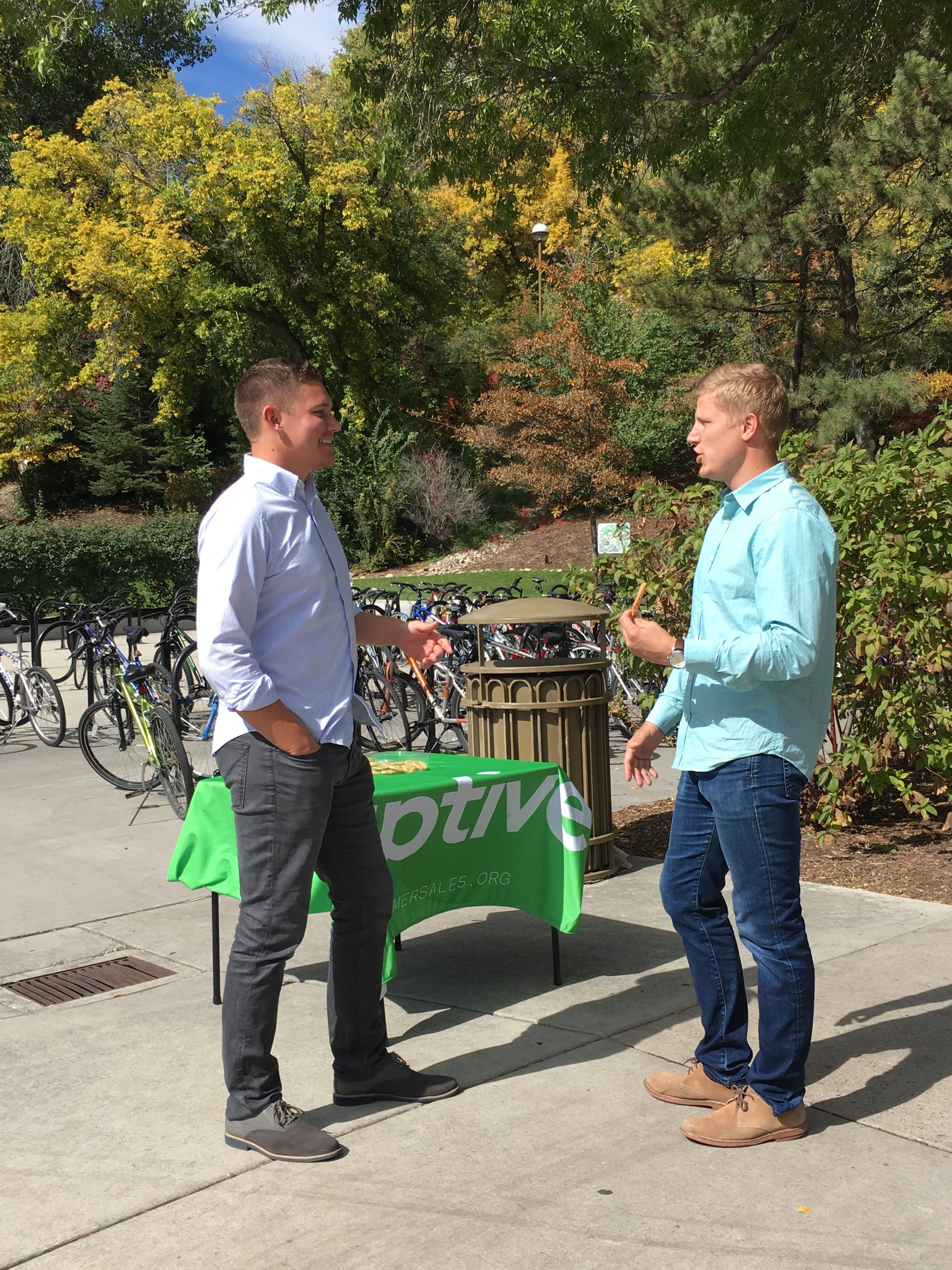
Spencer Hollingsworth dreaded talking with Conner Ruggio at first because he could tell Ruggio was a sales recruiter from Aptive, a pest control company. He thought sales recruiters were awkward and pushy. However, he said his experience talking to Ruggio played out differently than he initially expected.
“I talked to him and he was like, ‘Hi I don’t think I’ve met you before, what’s your name?’ I was like, ‘Oh this is nice, this is actually kind of normal,'” Hollingsworth said.
Hollingsworth now works as a sales recruiter for Aptive.
It’s fall semester, and sales companies aren’t wasting time recruiting potential employees. Ruggio, an economics graduate from BYU and senior regional manager at Aptive, has been recruiting in Provo for four years.
“With recruiting, there’s really two different ways,” Ruggio said, “cold contacting and going through your network.”
One place Aptive recruiters do cold contacting is near BYU campus, according to Ruggio. Cold contacting is when recruiters talk to students on the street just as Ruggio talked to Hollingsworth a couple years ago.
J.P. Arlie, national sales director for Vivint, said he hasn’t had to cold contact in the 25 years he has recruited on campuses.
“Typically when a school’s policy is not to let us on campus, I don’t look for loopholes,” Arlie said. “Putting a table just off campus doesn’t allow us to eventually be on campus again.”
Arlie said he feels it is more effective to be allowed on campus and pass flyers around to students. He said networking, on the other hand, is Vivint’s number one contributor to sales teams.
Vivint plans events so managers and representatives have a way to introduce their friends to Vivint, according to Arlie. He said this helps them push their friends in the direction of summer sales.
“As long as you have a healthy culture, you’re never going to have a problem recruiting people on your team,” Arlie said.
Networking is key, according to Ruggio. He said his network included a lot of friends who saw how well he did his first summer with sales. This made it easier for him to approach his friends about joining Aptive.
Ruggio called himself an introvert who networks. He appreciates the relationships he develops with other people and said he wants his recruiters to value those relationships as well. Because of that, he said the best salesperson might not be the best recruiter.
“During the recruiting process, no one wants to be sold,” Ruggio said. “If a guy comes in and meets with me and just feels like I’m trying to use sales tactics, he’s probably not going to want to work here. And I don’t blame him.”
One of Ruggio’s best recruiters is Hollingsworth because he tries to be personable, friendly and laid-back when he recruits.
Hollingsworth usually works from about 9 a.m. to midnight, meeting with people and telling them about summer sales during the off-season. One of the people he met recently was Alek Sperry, a freshman at BYU.
Sperry said he met with Hollingsworth because his cousins have experience with sales and he wanted to learn more about summer sales.
According to Sperry, Hollingsworth helped him understand everything he’d be doing during this semester as well as the summer. Sperry said he felt the flexible hours would be good for his schedule as a student.
“As I’ve learned about the figures and how it fits in with my schedule, it just makes sense,” Sperry said.
Information systems sophomore Bo Bleyl tried summer sales last summer for Edge. His sister-in-law’s cousin also did sales with Edge, so Bleyl got in contact with him and was later introduced to a manager winter semester 2016.
A family friend who worked for Edge and a manager took Bleyl out to lunch and spent 45 minutes trying to recruit him to work for Edge.
“We talked about what it was that they do for summer sale and my expectations,” Bleyl said.
Bleyl talked to the manager again and decided shortly after to work for Edge a week later. He met regularly from February to April with his manager and trained for the summer. The training consisted of videos, role-plays and selling to some people in the Provo area, according to Bleyl.
“The manager would basically shadow me, give me points and tell me things I could improve,” Bleyl said.
The main pattern of off-season agenda for summer sales companies is recruit, hire, repeat and have fun, according to Hollingsworth.




